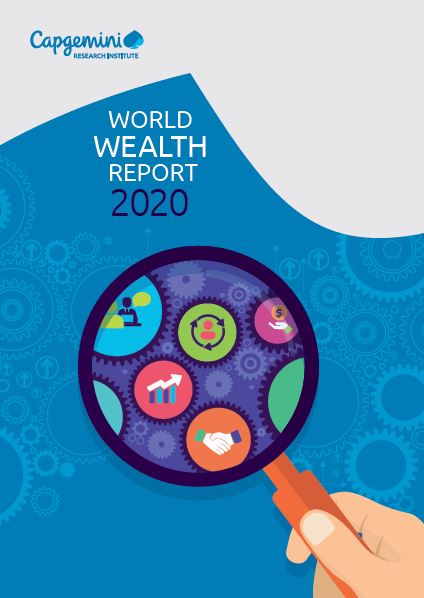What is this report?

The World Wealth Report is an annual report about the wealth of high net worth individuals (HNWI) and the economic conditions in the Wealth Management industry. This year’s report is the 23rd year based on responses from over 2,500 HNWIs in 21 wealth markets, administered between January and February 2020.
Capgemini defines HNWI as those who have “investable assets of US$1 million or more, excluding primary residence, collectibles, consumables, and consumer durables.”
What are the key findings from the article?
- In 2019, global wealth grew by 8.6% with a growth of 8.8% in HNWI. North America lead growth with 11%, taking over the lead from Asia Pacific for the first time since 2012. While there was general uncertainty over trade disputes and “geopolitical unrest,” the US saw gains in the fourth quarter as US and China reached a Phase One trade deal, as well as the Fed providing money to the financial system in September and “optimizing surrounding technology companies.”
- The top five countries with the highest population of high net worth individuals in 2019 were: US, Japan, Germany, China, and France. The top four countries have remained the top since 2017.
- However, the first quarter of 2020 saw a loss of $18 trillion from global markets due to COVID-19. There was some recovery in April but Capgemini estimates that there was a decline in global wealth of 6-8% at the end of April 2020 compared to 2019. Capgemini expects 2020 to be “a year of unusual market growth trends.”
- The ultra-HNWI population saw an increase in 9% in 2019 and an 8% increase in wealth in 2018. However, wealth growth was “below average compared with population growth.”
- Equity returned to the top spot of asset allocations in 2019. In years of economic decline, investors tend to shift their assets to “safer” categories of cash and fixed income. Equity remained the top category even in the first two months of the year. However, the uncertainty of 2020 may see a shift from equity back to cash.
- Investors are interested in sustainable investing. 27% of HNWI have shown an interest in sustainable investing with 40% of Ultra-HNWIs interested. Capgemini notes that HNWI are planning to put 41% of their portfolio into sustainable investing by the end of 2020 and 46% by the end of 2021. In January-April 2020, investors put $12 billion into funds “that invest in ESG practices” (Environmental, Social and Governance funds).
What can I do as a result?
- Despite the economic downturn from COVID-19, there are people and companies who are acquiring wealth and should be asked for philanthropic contributions. Some industries, such as grocery stores, sanitation manufactures, telecommunications, are doing well. However, before soliciting to potential prospects, fundraisers should talk to their prospects to assess how they are feeling before making the ask.
- Since equity was the top asset class for 2019, fundraisers may want to explore giving from non-cash assets. While cash gifts are easier to give and receive, people often hold their wealth in other assets and may give more from their assets, such as stocks, bonds, etc. Market volatility might make gifts of stock more attractive as a way to offset taxes.
- Given the increasing popularity of sustainable investing, there may be an opportunity for environmental and conservation nonprofits to find new prospects willing to invest in their causes. Fundraisers may want to use language related to investing to relate to those prospects.
- Continue to communicate with donor prospects. Given the uncertainty of 2020, it’s important to talk to your donors and prospects to see where they are. While the economic downturn and pandemic have turned many established pillars of fundraising on its head, there’s opportunity and great need to adapt fundraising strategies to the new world order.
Additional Resources
- World Wealth Report | Capgemini 2020
- How to Ask for Money in a Crisis | Chronicle of Philanthropy 2020
- Fundraising Prospect Research Support in a Crisis | Aspire Research Group 2020
- 8 Things Resilient Fundraisers Should be Doing Now | sgENGAGE 2020
- Please Don’t Donate Cash | PG Calc 2018
- Cash is Not King in Fundraising Executive Summary | PG Calc 2018
- Not Asking for Millions? Why Should You Care About HNWIs? | Jennifer Filla blog 2018